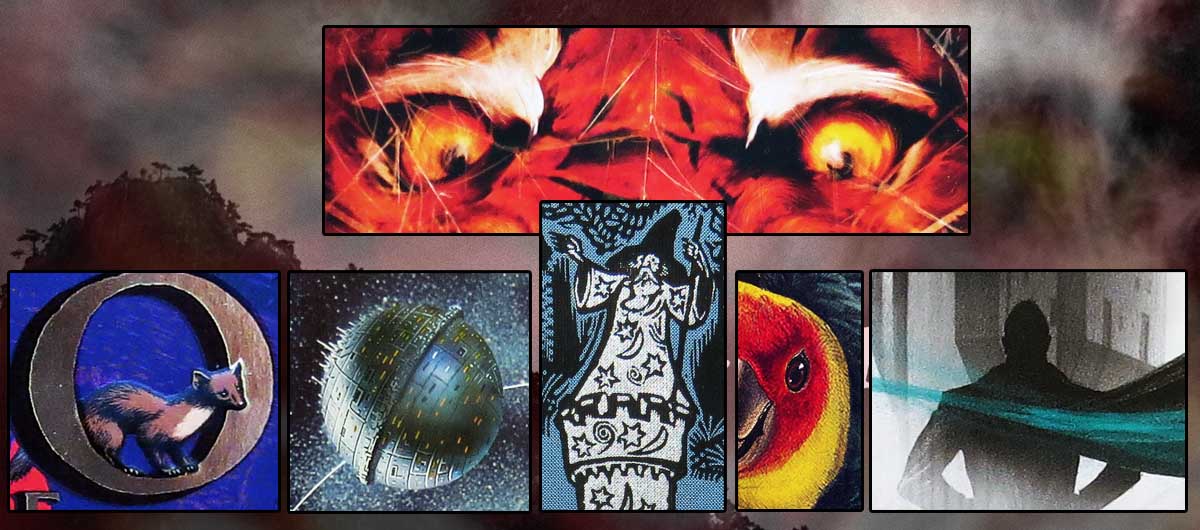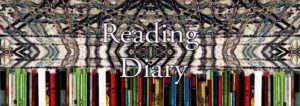From This Census-Taker, via The Secret Commonwealth, to Here We Are, and stops between. An entry in my reading diary with a bias towards the fantastic.
This Census-Taker
China Miëville tends to write long, complex, involved novels on the frontiers of Science Fiction, Fantasy and Magical Realism. Two I rate particularly highly are Railsea and The City and the City, thick books both of them. I’m working my way through Miëvelle’s opus. At the same time, for my reading resolution, I find myself this year trying to limit the number of really chunky books I pick up. (I’m not proud of it, but it does seem to be what’s going on.) So it was both a bit of a surprise and a delight to find this slim volume on the shelves of my local SF book shop.
This Census-Taker is a good read and packs a lot into a small scope. In a post-apocalyptic world where human civilization scratches along in the ruins of what was once but is no more, a man, a woman and their child live on the rocky slopes of a mountain at edge of a town. The child is the narrator and his father the subject. The father is a migrant, a refugee, perhaps a fugitive. He makes ‘keys’ – amulets apparently – from scraps of metal. The boy’s mother, who is a local woman, farms and barters her produce in the community. The father enjoys killing things, animals and perhaps people. Perhaps the boy’s mother. The boy is afraid of him.
One day a census-taker from the man’s society arrives in town. The census-taker seems to be a law officer and a judge as well. Possibly an executioner. The boy leaves town as the census-keeper’s apprentice. It’s a bleak little book, though not as much as my thin review here makes out. The society and the characters are fascinating, yet much is left to the reader’s imagination.
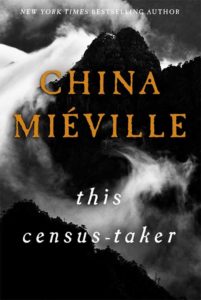
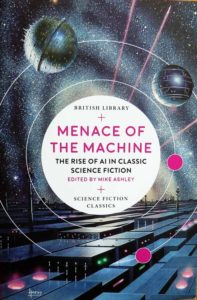

Menace of the Machine
Mike Ashley is an academic with a string of non-fiction titles in the SF/Fantasy field to his name. He has also been responsible for a series of anthologies of stories in the same field. Menace of the Machine: The Rise of AI in Classic Science Fiction collects 14 stories by various authors from the now forgotten to the still revered. The earliest, “The Discontented Machine” by Adeline Knapp was published in 1894. It tells the story of a cloth- and clothes-making machine, employed to undercut human workers. It becomes conscious and goes on strike for better conditions.
Among the better stories is EM Forster’s “The Machine Stops”. (Originally from 1909 and still a powerful read.) The volume includes stories by the “big names”, Arthur C Clarke, Isaac Asimov and Brian W Aldiss. (“Dial ‘F’ for Frankenstein” (1965), “The Evitable Conflict” (1950), and “But Who can Replace a Man?” (1958) respectively.) But it is among the more obscure stories that Ashley finds some gems. My favourite is “A Logic Named Joe” by William F Jenkins, originally published in 1946. The story predicts the Internet and social media. (They aren’t called that, but that’s what they are.)
“A Logic Named Joe” foresees not only social media, but also several of the problems we have come to associate with it. One character searches for information on how to kill his wife, and the Logic named Joe obliges. Later on “kids an’ teenagers who wanted to know what comes after the bees an’ flowers found out.” (Yes, the story was written by a man. In 1946. It shows.) Finally, to answer questions people are asking about one another, Joe starts to collect personal information on everyone and reveal it to anyone in reply to the right question. Sound familiar?
Steelheart
I wasn’t sure what this book was when I picked it up. The author, Brandon Sanderson, was recommended by an acquaintance as a writer of both SF and Fantasy. In the SF bookshop, I deliberately picked Steelheart off the SF shelf rather than, say, Mistborn from among the Fantasy titles. I was feeling the call of hard SF at the time. Turned out, Steelheart is not that. It is a YA novel about a world where superheroes exist, but are all supervillains. (Or most of them anyway.) Initially I was put off. I’m heartily tired of all these superhero stories. But it’s a well-written page turner and it does get on to exploring some more philosophical issues eventually. It’s the first in a series, so perhaps later volumes will develop that side of things.
The Secret Commonwealth
This title is no more hard SF than Steelheart, but it’s a great deal more up my street. Volume 2 of The Book of Dust trilogy which is Philip Pullman’s sequel to His Dark Materials. The first in the new series, La Belle Sauvage, takes place earlier than the events of His Dark Materials. The Secret Commonwealth and the forthcoming, as yet unnamed third volume take place ten or so years after His Dark Materials. Lyra, our heroine from the earlier series, is grown up now. She is still engaged in resistance to The Authority and the world-spanning church organisation that merges Calvinism and Catholicism.
News is spreading of a remarkable rose oil from central Asia. An oil that enables the human eye to see Dust. Lyra, her dæmon Pantalaimon, and Malcolm Polstead (from La Belle Sauvage) are drawn into investigating. Separately, they travel to the east and exploring more of Lyra’s world. Because Lyra and Malcolm are now adults, this is no longer a novel for children. (There’s a question mark in my mind over whether The Amber Spyglass, the third part of His Dark Materials, was ever a children’s book.) This means there are some events and some depictions of violence especially that made this reader sit up and take notice. The Secret Commonwealth tells a story that does not reach an end. The book closes with the promise To be concluded… So, we must wait.



Anansi Boys
I’m following Neil Gaiman’s Masterclass and and he read a small extract from Anansi Boys to illustrate a point he was making. It was about a lime. If you know the book, you’ll understand. (If not, maybe you’ll be intrigued and go away and read it.) I thought, why haven’t I read that book? Well, now I have.
The west African trickster god is Anansi, a spider. Later in life, in the USA he became Brer Rabbit. The book is comfortable with a god who can be at one and the same time a human-seeming person, a rabbit and a spider. You, as the reader, find yourself comfortable with it too. Anansi living in Florida in the 20th century, is the father of a son – or maybe it’s two sons. The Anansi boys were one but got split in two with a bit of magic after an accident when they were quite small. One of the boys, Fat Charlie, grows up with his mother in London, ignorant of his ancestry. The other, Spider, seems always to have known he was a demi-god, and lived accordingly, but independently from Fat Charlie.
Anansi’s death brings the brothers together again, but not without complexity. They have to go on a long journey together, in this world and in the spirit world, to rescue the people closest to them. And they need to discover themselves, and become reconciled with one another and with the spirit of their father. Hmm. It seems a bit bald and earnest, put like that. In fact it’s a very funny book and had me laugh out loud more than once. (Believe me, that’s a good recommendation.)
The Sword in the Stone
I haven’t been reading these titles one after the other, it just looks that way in this blog post. There were a couple of titles between Anansi Boys and The Sword in the Stone, but in a way the former got me to re-read the latter. TH White’s children’s classic is also a joyful, humorous book. It also has some serious, philosophical points to make. Merlin, who is living backwards and in the putative 12th century, remembers the 20th, is employed as a tutor to Wart and Kay.
Merlin’s magic works in a kind of hit-or-miss fashion, but except where Wart’s education is concerned. The magician turns Wart into animals and birds to learn from them lessons that will make him a good and able man. Merlin also sends Wart and Kay off to meet with Robin Wood (aka Hood), and to fight black magic in the form of mythical monsters and evil witches.It seems that Wart is destined to be Sir Kay’s squire and servant, but then, in a London churchyard, he pulls the sword from the stone and is revealed to be Arthur, the Once and Future King.
My edition of The Sword in the Stone comes bound with the other three volumes of The Once and Future King, so I’m planning to re-read them too, in order, but for now this was enough.
Here We Are
And so, Here We Are, at the end. The final title in my reading diary entry is Graham Swift’s latest novel, published last year and just out in paperback. At least, just available in paperback in my local bookshop. Swift is generally an author of very solid realism. His most previous novel, Mothering Sunday, was a beautiful encapsulation of a life of domestic maid servant Jane Fairchild, and a moment – Sunday 30th March (Mothering Sunday) in 1924. Here We Are ventures into Magical Realism. In the theatre at the end of Brighton pier in 1958, Jack Robbins is the compère of a variety show. The magic act, Pablo and Eve, (Jack’s friend Ronnie Deane, and his “beautiful assistant” and fiancée Evie White), astound all-comers with their illusions. Gradually Pablo and Eve move up the billing till, at the end of the season, they are the main draw.
But Jack and Evie are having an affair and maybe Ronnie realises what is happening. Graham Swift keeps the reader guessing till very near the end. I certainly kept expecting something like a murder with a body dumped through a trapdoor into the sea beneath the pier. But no.
The end is pure magic. And I’m not going to say more than that.
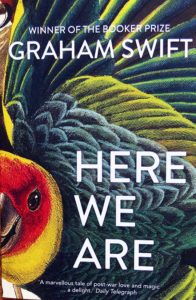
Reading list
So there you have it, my latest reading diary. I hope you find something among all these titles to enjoy yourself. In the list below, links from the titles go to their GoodReads page, links from the authors go to their websites, or appropriate Wikipedia articles.
- This Census-Taker by China Miëville
- Menace of the Machine: The Rise of AI in Classic Science Fiction compiled by Mike Ashley
- Steelheart by Brandon Sanderson
- The Secret Commonwealth by Philip Pullman
- Anansi Boys by Neil Gaiman
- The Sword in the Stone by TH White
- Here We Are by Graham Swift

